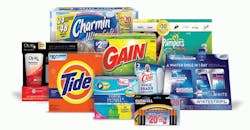The world’s biggest consumer-products maker is being pressured by one of its largest shareholders to set aside “suffocating bureaucracy” and pursue new brands and online sales.
Procter & Gamble Co. needs to reorganize its business units, invest in smaller, high-growth brands and prioritize its digital strategy, billionaire Nelson Peltz said in a 93-page plan for modernizing the company.
Those recommendations are part of his escalating battle for a seat on the board of P&G, the owner of well-known brands such as Bounty, Gillette and Tide. The previous day, former CEO John Pepper emerged from retirement to oppose Peltz’s bid, warning it risks “putting a serious brake on our momentum” and setting the company on the wrong course.
Peltz’s Trian Fund Management owns about $3.5 billion of P&G stock, making the shareholder activist the company’s sixth-largest investor, according to data compiled by Bloomberg.
Peltz is calling for P&G to reorganize into three largely autonomous units: a beauty, grooming and health-care business; a fabric and home-care division; and baby, feminine and family-care products. Each unit would have regional leaders with full control over operations in their areas.
The move would break up P&G’s “matrix” organizational structure, which Trian said slows decision making as well as the company’s ability to respond to market changes.
“P&G has resorted to short-term measures, such as selling brands instead of fixing them, that did not address the root cause of its underperformance,” the New York hedge fund said in a statement accompanying the paper on Sept. 6. Despite numerous turnaround plans, portfolio changes and chief executive officers, the company continues to suffer from eroding market share, aging brands, high costs and executive compensation and a “suffocating bureaucracy,” Trian said.
In response to the report, P&G said on Sept. 7 that Peltz has “a very outdated and misinformed view” of the business. Trian ignores that the company’s brands often lead the market and carry industry-leading margins. P&G also has returned more than $130 billion to investors over the past decade, the company said.
Since CEO David Taylor took the helm in November 2015, P&G has delivered shareholder returns of 28% -- “well above the 12% average of the peers selected by Trian throughout that same time period,” the company said.
More Expensive?
P&G also said it has evaluated a similar structure to what Peltz is proposing and felt it would actually make the business more bureaucratic.
“We concluded that this approach would result in higher costs, lower efficiency, reduced profits and an added layer of management complexity,” the company said.
P&G, with a market valuation of about $236 billion, is working to transform itself into a more nimble business that can navigate the era of Amazon.com Inc., in which household staples are increasingly likely to be bought online rather than off the shelves of supermarkets and drugstores. Current CEO David Taylor’s turnaround plan got a dose of credibility in July after P&G’s earnings exceeded Wall Street’s expectations.
Cost Cuts
Peltz, who’s up for nomination at the company’s annual meeting on Oct. 10, is “open-minded and receptive to superior ideas” about the best path for P&G, according to Trian’s statement.
Among his recommendations, Peltz wants cost cutting at P&G to be redirected to ensure it improves earnings and sales growth, claiming that $10 billion in savings from a 2012 productivity drive hasn’t improved operating results. Adding him to the board will help ensure the current target of $12 billion to $13 billion in savings will be used more effectively, according to the white paper.
P&G should acquire and integrate smaller, high-growth brand to reflect a shift in consumer trends toward more local producers, Trian said. The company should also examine why it has failed to innovate after failing “to create a new meaningful brand in nearly 20 years.”
“The primary challenge for P&G has been market share losses -- both to traditional competitors as well as to small, midsize and local competitors who are adapting to industry changes more quickly and effectively,” the hedge fund wrote.
Gillette, Dollar Shave
Trian is also urging P&G to prioritize its digital strategy as new e-commerce brands enter the market, citing online razor-subscription services Dollar Shave Club LLC and Harry’s as significant competition to P&G’s Gillette brand. Dollar Shave Club, which sells razors for as little as $1 a month, was acquired by Unilever last year in a deal worth about $1 billion.
P&G should hire more people from outside of the company to break up its insular culture, Trian said, pointing out that only three of P&G’s 33 executives have worked for more than three years elsewhere.
“In our experience, there is a correlation between underperforming companies and the unwillingness to embrace outside perspectives,” Trian said.
Trian wants the company to set a goal of having a quarter of top 100 executives with significant outside experience.
After first revealing a stake in P&G in February, Trian said in July it would seek a seat on the board for Peltz. P&G has rejected that effort, saying Peltz would be a distraction and add little value to the board.
The proxy fight at P&G is only Peltz’s third since he co-founded Trian in 2005. The firm waged a hard-fought battle at H.J. Heinz Co. in 2006 that resulted in it winning two board seats, but lost a similar fight at DuPont Co. two years ago.
By Scott Deveau
About the Author
Bloomberg
Licensed content from Bloomberg, copyright 2016.
